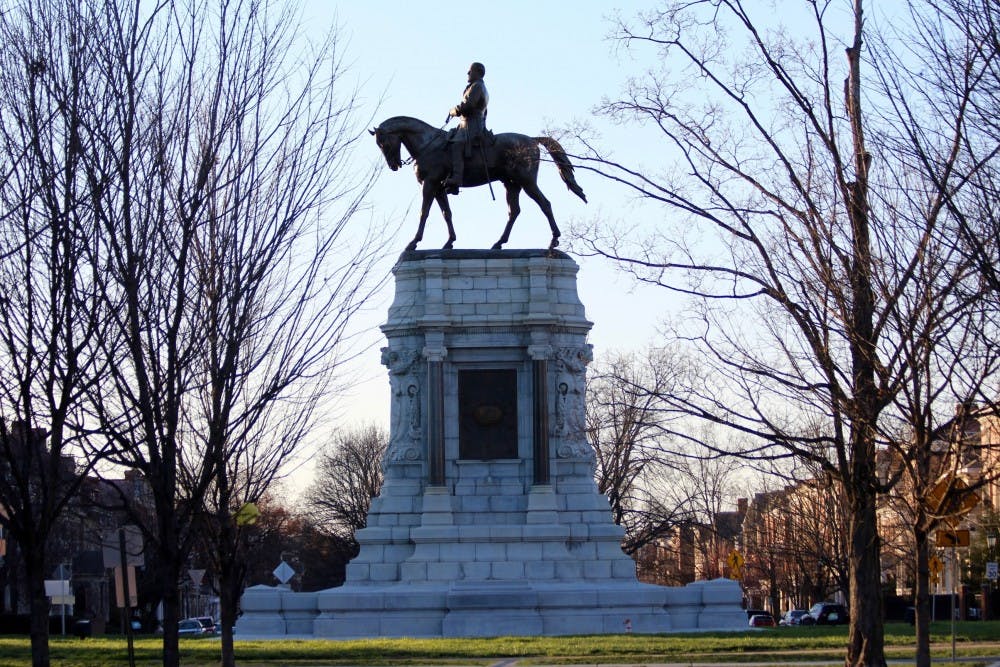Following his time on the Monument Avenue Commission, professor Julian Hayter of the Jepson School of Leadership Studies is taking on a new role in the city of Richmond as a member of the History and Culture Commission.
In the summer of 2018, the Monument Avenue Commission solicited feedback from Richmond’s public on what should be done about the statues of Confederate generals on Monument Avenue.
Members of the History and Culture Commission were appointed by Mayor Levar Stoney as a response to the findings of the Monument Avenue Commission, which recommended removing the monument to Jefferson Davis and adding contextual signs to the other Confederate monuments.
The new History and Culture Commission will work to implement changes recommended by the Monument Avenue Commission report and rethink how the city should memorialize the slave trade in Shockoe Bottom, according to an article in the Richmond Times-Dispatch.
According to the article, the commission will have nine voting members, including Hayter, and will meet publicly at least once every two months.
Hayter said he hoped the commission would have a positive impact on both the city of Richmond and the campus community at UR.
“We not only share a name with the city of Richmond,” he said. “Richmond is part of the University of Richmond’s identity. And the relationship between the city of Richmond and the University of Richmond hasn’t nearly been as intimate as it has been recently. More importantly, we started to see in recent years an explosion of activity with professors working more closely with the city.”
Hayter emphasized that many of the top institutions in the country make a concerted effort to be deeply involved in the communities that surround them.
He said that although he wanted to see more students getting involved in the city of Richmond, it was important for students to think sincerely about the work that they were doing in the city.
“Are you building the kind of reciprocal relationships that aren’t poverty tourism, that aren’t based on exploitation?” he asked. “Are you using the city of Richmond to just bolster your resume, or are you sincerely concerned about doing good work in the city of Richmond itself?”
Junior Mehreen Usman has had Hayter as a professor in her leadership classes, and said she thought he would be an excellent addition to the History and Culture commission both for the city and to foster conversations about issues of race and history on campus.
“He’s the most real professor I’ve ever had,” she said. “He doesn’t say any bulls--t … every single time I would leave his class, I would be really angry because we would talk about all of these issues of justice in the United States. ... He’s such a good motivator for people to make change.”
Enjoy what you're reading?
Signup for our newsletter
Sandra Peart, dean of the leadership school, agreed.
“Dr. Hayter is renowned for his ability to engage students in civil discourse about important, controversial issues," she said. "He will bring the same issues being debated by city residents to the University of Richmond, and will facilitate lively discussions for students, faculty and staff on our campus.”
Usman and Peart both emphasized that the issues being addressed by the History and Culture Commission are not isolated. They are relevant both on UR’s campus and throughout the country.
“The foundation of this school has been based on very racist beginnings,” Usman said. “Every single thing that’s ever been connected to U of R is just intrinsically linked to race relations and race issues.
"I think it’s easy to think that we’re away from those times now, but I see [those issues] every single day at school. There’s still definitely a lot of work to be done, and I think having Dr. Hayter doing something for the city of Richmond would impact really positively because maybe it will get more people interested, and involved in these issues."
Peart connected the commission not only to conversations about UR’s history, but to the history of the U.S. as a whole.
“These issues are deeply rooted in American history,” she said. “Students have a chance to be involved in telling our nation’s story of slavery, the Civil War, Jim Crow and institutional racism in a more inclusive way that will have ramifications for racial healing and equity.”
Hayter said that although both the Monument Avenue Commission and the History and Culture commission had been hard work, he thought they were steps in the right direction for the city of Richmond.
“Slowly but surely the city’s moving forward,” he said. “These commissions are evidence that people in positions of authority, that Richmond citizens, are willing to meet the challenges of the 21st century in a way that they were not in the 20th century.”
He added that he thought the city was finally beginning to come to terms with some of the uglier parts of its history, as well as acknowledging its responsibility to its future inhabitants.
“[In forming these committees,] we started to make what I would call incremental inroads into having a more robust conversation about how Richmond got to now," Hayter said. "And that is extremely important not just for the people who are alive right now, but for future generations of people who the city of Richmond has an obligation to tell a better story to."
Contact contributor Rebecca Rohn at rebecca.rohn@richmond.edu.
Support independent student media
You can make a tax-deductible donation by clicking the button below, which takes you to our secure PayPal account. The page is set up to receive contributions in whatever amount you designate. We look forward to using the money we raise to further our mission of providing honest and accurate information to students, faculty, staff, alumni and others in the general public.
Donate Now



